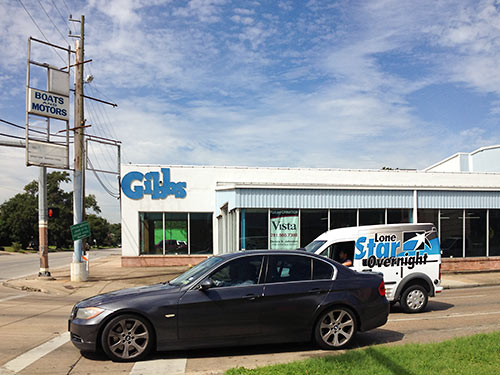
How cool is it that a boat store with metal siding and a groovy sixties-era sign stood at the corner of West Gray and Montrose Blvd. for 56 years? Well, pieces of the iconic Gibbs Boats sign floated away after the last hurricane; if the property sells, the store won’t be around much longer either.
The giant for-sale sign that went up on the storefront windows yesterday has drawn a bit more attention from potential buyers than the online listing for the 24,925-sq.-ft. L-shaped property, which has been posted for about a month now. The listed asking price is $150 per sq. ft. of land.
***
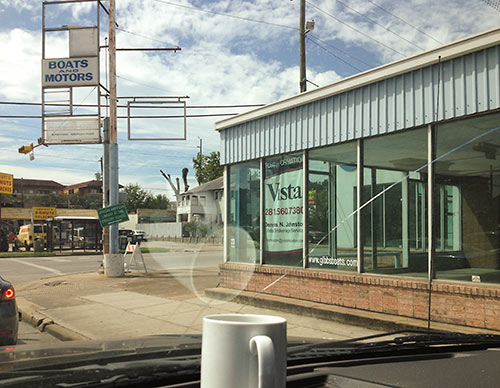
Gibbs Warley Jr., who’s worked at Gibbs Boats full-time since 1973, tells Swamplot the shop sold its last new boat in January, and that the store is just a service business now. (Warley’s father, Gibbs Warley Sr., moved it to its current spot at 1110 West Gray St. in 1958 from a Midtown site behind the fire museum on Milam St.; it was started on Fairview not long after World War II.)
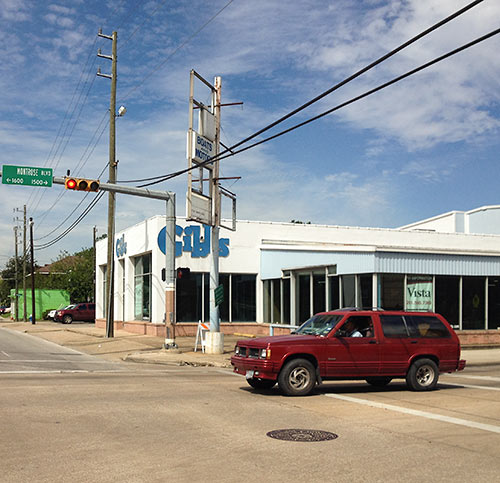
The Warleys don’t have plans to open a new location after the property sells. After Gibbs is gone, Red Wing Boat Co. on S. 75th St. and Helton Boat Works off OST near Hwy. 288 will be the only boating shops remaining inside the Loop.
- 24,925 SF Montrose & W. Gray [Commercial Gateway]
Photos: Swamplot inbox


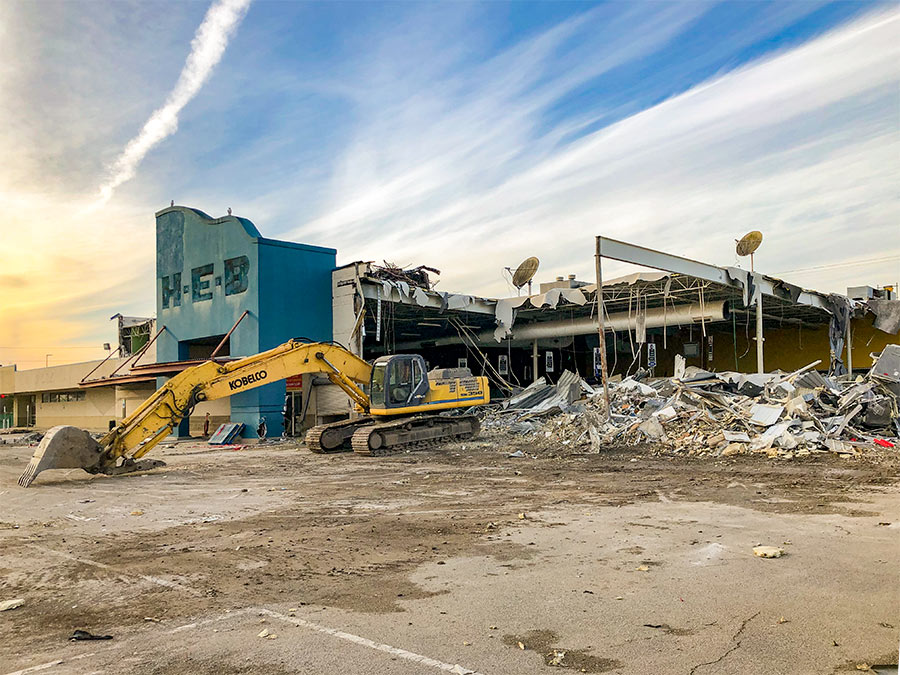
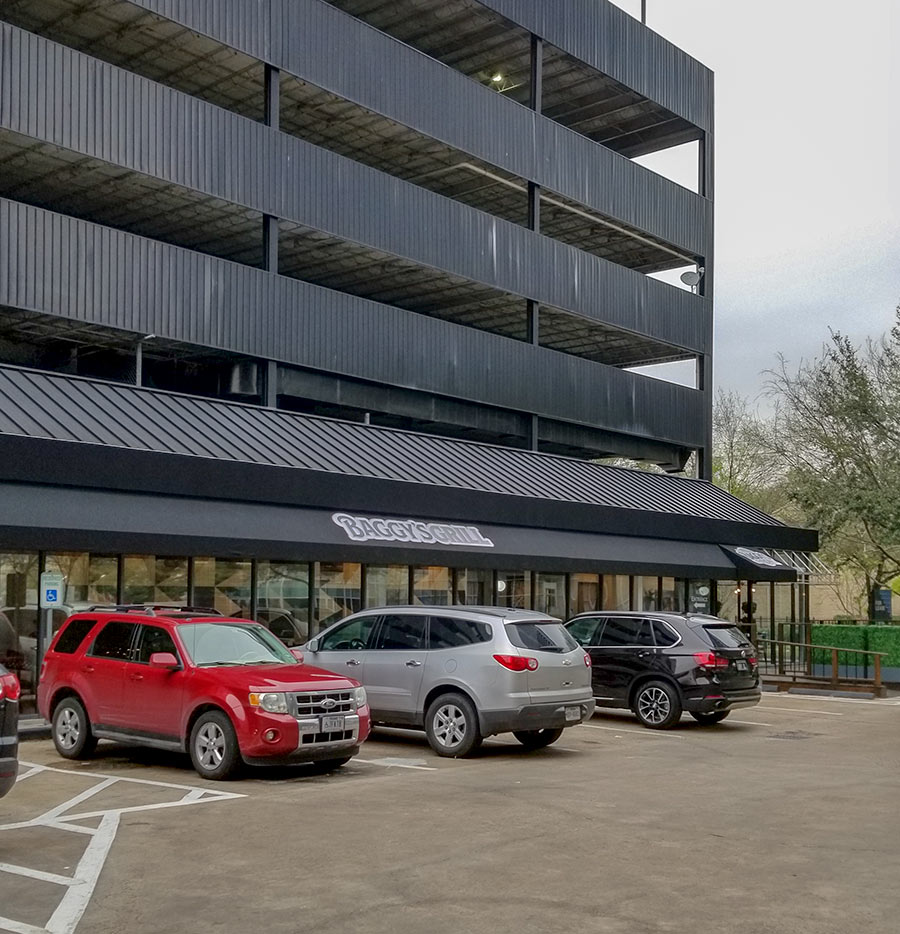
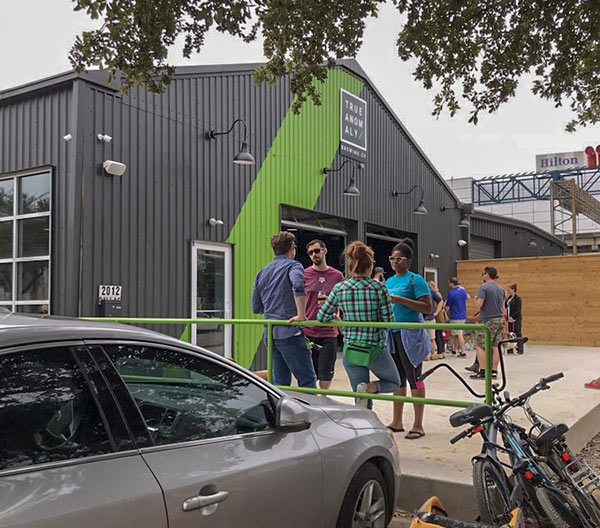
When I was a kid in the burbs, we would frequently do school field trips to the museums and Hermann Park. This took us right down Montrose in our school bus. This boat store was the landmark that let us know we were approaching the condom store (“Condoms Galore”?) – then we’d point, laugh and giggle.
$3.7 million? WTF has happened to my neighborhood? Don’t get me wrong, I’m glad for the continuing rise in my property value, but if this keeps up at these rates, our tax bill is gonna get unmanageable.
Hope the new buyer re-purposes the “Gibbs” sign. I remember going boat shopping there with my dad in the 60’s, along with Heights Tackle Shop on Heights Blvd.
$150/sf?? Okay fine… All my Montrose stuff is for sale for $150/sf.
.
Montrose (price) has gone nuts.
Cody, yeah I agree with you. If this isn’t the top of a market cycle, it’s damn close. If you bought low, now is the time to sell high. And do it without regret because you’ll never go broke by profit-taking. But even more than your Montrose assets, sell the stuff that you’ve got that is further east. In a downturn, there will be a flight to asset quality both on the part of capital markets and tenants. Montrose values will go down, but Greater Third Ward be much more volatile.
Use some of the proceeds to short high-yield bonds, use the remainder to reposition your outfit as an apartment management company. No matter how bad things get, there will always be a need for management companies, and this gives you a way to maintain the continuity of your career and to keep your ear to the ground. Then, in the worst of the down-cycle, while most everybody else is paralyzed and some are distressed sellers, you’ll have cash (hopefully a LOT of cash if that short position plays out for you the way I think that it might), a company, and a resume.
And when my prediction pans out and you’re fantastically successful, don’t forget whose crystal ball made it possible. I might need a job by then.
@DynamoChelsea & Cody- This is great news with the property values going up. If you can’t afford taxes then move outside of the loop. It’s about time Houston flushes out the trash.
GET BACK TO WORK!
so we’re expecting a 5-7 story condo tower popping up there now, right?
Mr. Warley can now retire comfortably (depending on his lifestyle) with a $3.7 million payoff from the sale of the property. Good for him.
Please, God, anything but apartments.
@stuart smith – You do not seem very nice.
Gobbs, aka Quality Laundry: http://www.houstondeco.org/1930s/quality.html
Haha – GIBBS not Gobbs
I don’t think we’re anywhere close to the peak of property values in Montrose. You can still get an older 1,500 square foot townhome in the area for under $250,000. The average price for a bigger (~2,500sf) recent construction townhome is probably around $600,000. Those prices would be laughably low in comparable neighborhoods in most cities. Gentrification doesn’t really stop halfway like that barring a major economic downturn–once the ball starts rolling like this it just keeps going until the whole neighborhood is gleaming and wealthy. If you think Montrose has reached that point yet, you’re wrong. A fully gentrified urban neighborhood doesn’t have horrible apartment complexes like Takara So or vacant lots and skeazy strip centers on its main commercial street. Gentrification isn’t going to stop in Montrose until you can’t get a new townhome for less than a million or an apartment for less than $1,400.
People have been talking about Montrose values topping out for decades. I knew a guy who used buy Montrose houses for $30k and fix them up for sale/rent. When Montrose houses values hit $75k, he moved to the sidelines. Too rich for my blood. How much higher can they go????
This post should be tagged 77019, not 77006.
I’m glad to see this go. It has been an eyesore for many years. I just hope El Tiempo stays!
@Alex: Thanks! Fixed it.
“Gentrification doesn’t really stop halfway like that barring a major economic downturn”
Exactly. I wasn’t making a long-term forecast about Montrose. I think that it will be quite valuable in twenty years, and that if you buy and hold and operate a property competently then I think you’ll do alright. However, most homeowners and even fewer commercial investors plan on being in any given deal for that long; and even those that are optimistic about their future stability should probably have an exit strategy in mind in case their life circumstances change at an unexpected and/or inconvenient time for them.
The relevant time horizon on my advice is six months to three years. If you’re actively and nimbly playing the market, as somebody like Cody is able to do, then you can buy and sell the business cycle by essentially servicing the needs of passive investors throughout that cycle.
Bernard, it’s not about simply whether or not montrose assets will continue to gain in price as they probably always will, but it’s how those property assets perform in comparison to other assets and markers such as inflation and stocks. let’s not forget that it’s time for the feds to stat raising interest rates as we’re never going to see the same employment rate come back as before the recent recession and a lot of assets such as stocks and high-performing properties have already had their values goosed up with these low rates.
***
Christian, i’m not in real estate, but to me it’s all about supply and demand. current prices are based on a supply crunch that Houston hasn’t experienced in my lifetime, the past 30yrs. however, montrose single-family home construction is now continuing at a similar pace as it was in 2005 during the current re-gentrification phase before the recession and the multi-family construction is unprecedented as far as I’m aware. employment growth has already slowed though so it just depends on how much of this new construction is filling in the old demand and can continue to meet demand moving forward. although we are in a bit of a precarious situation with annual rent for an older 2-bd duplex being below or equal to that of taxes/insurance on a new build, i certainly haven’t seen enough demand to account for an entire clean sweep of the area’s older inventory. there’s lots of empty lots at the moment and tons more inventory to be cleared. yes it will all change eventually, but even in other cities with more centralized job markets this can take decades and you don’t make bets on property with those kinds of durations.
***
but really, if you’re watching houston real estate then you also need to keep an eye on oil and gas futures which have hit a lot of headwinds this past year and the momentum is still towards the down side. outside of any other majors consolidating their offices down here to Houston I don’t see how anyone can expect employment growth to regain it’s recent trend of the past few years.
When I bought in the Heights a few years ago everyone was saying that the appreciation was all done and that GOOF was where you had to buy to see any appreciation. Now, a 1000 sq ft bungalow that was going for $270-280k would easily get $425k+ (and climbing). Neighborhoods like the Heights, Montrose, Midtown, etc. are not just seeing appreciation in a vacuum. There is real value being added to these neighborhoods every day beyond exchanging rundown residential properties for new or renovated ones. The Heights has about a dozen new restaurants, new hike and bike path that is continuing to expand, rapidly improving schools and a wonderful art installation on the Esplanade that has been written up in national publications. Also, all of the inner loop will reap the benefits of the Buffalo Bayou improvements (more events, food vendors and better amenities) and the huge benefit of not having to deal with the rapidly worsening commuter traffic. Yes, there is a market cycle at work and prices will eventually plateau and possibly fall back for a while before the next market cycle begins. But the market cycle is only temporary and the long term trajectory is going to be up because these neighborhoods are surging with improving quality of life that is a solid reality supporting the rising property prices.
@TheNiche walk me through your “short high-yield bonds” strategy. Are you talking swaps, or a broader interest rate hedge? And exactly how would it apply to the non-QIBs on this site?
solid valuation for this property, and a great deal for the owner who I always assumed laundered money for the Russian mod since he rarely had boats or customers in the shop.
It’s a great corner that’s why the ppsf is so high. This isn’t just anywhere in Montrose, it’s a very focal corner. Yeah, and it will get a very acreage mid rise on it. Like everything else in Montrose, some areas are far more attractive to developers than others. Still, I’m sure the values will continue to rise, but 150 is getting up there.
just because they’re asking $150/sqft doesn’t mean they’ll get it. Seems pretty damn steep to me…even in this market.
@ Old School: You’re pushing a “new normal” line of argument, whereas I’m in the “irrational exuberance” camp. A lot of people are towing the “new normal” line, but I can’t see that the economics are any fundamentally different than they’ve ever been. Monetary policy has got the global capital markets massively distorted again. Houston has direct and disproportionate risk exposure through fracking operations that rely heavily on junk bonds, and it has indirect exposure because a global recession would curtail energy demand. And as joel rightly pointed out, there’s already plenty of headwind in commodities. I would expect that we’re going to face up against something that looks and feels like a few multiples of Enron’s bankruptcy.
Moreover, specific to the Heights and other neighborhoods that are suddenly very expensive, it is absolutely vital to understand that the Fed’s top-down monetary policy has enabled a tremendous amount of wealth to accumulate to households that were already wealthy. That’s why, even in Houston, housing demand is now heavily skewed toward the best houses and the best neighborhoods. The Heights and other desirable Inner Loop neighborhoods were mostly passed-over by the subprime bust, but when the music stops, y’all aren’t going to be able to sit this one out. You’re going to participate in the hurt like everybody else.
@ D713: Your ability to short high-yield bonds is constrained by the amount of money that you have to invest. The more you have at your disposal, the more awesomely targeted you can make your portfolio. For most people though, myself included, the best that can be done (that I’m aware of) is to buy an ETF. For instance, you might look up the ticker for SJB.
may get premium being across from Christie’s Donuts!
Houston’s economy is very diverse, “fracking” issues will only be a blip, if that. I disagree about The Heights somehow plateauing, these desirable, unique inner loop neighborhoods will always be in demand, a downturn could slow the appreciation, but only in the short term. How do you replicate a Norhill or Southampton or River Oaks? Answer: You Don’t. If you have a have a house in Norhill, you’re set.
I get all my financial advice from Swamplot posters!
When the Dallas economy cratered in the 80’s, Highland Park real estate was not effected at all, my Aunts house actually increased more as Dallas wheezed. Neighborhoods like River Oaks and Highland Park are immune to normal economic barometers and tho The Heights is certainly not in their league, it’s still a very desirable area and parts like Norhill and its cool Craftsman’s will sail thru the downturn.
@niche: If there is a recession, prices will fall. Duh. My point is that prices inside the loop are not just the result of an economic bubble. If lots in the Heights were going for $400-500k and Shade and the late great Cricket’s Creamery were the only restaurants in the area and someone was still burning empty houses on Ashland, I would be screaming bubble. But the Heights and much of the inner loop have become a very different place over the past 20 years, and especially the last 5 years. There has been a huge surge in the quality of life inside the loop. Yes, some restaurants and shops would close in a recession, but Washington Ave will not go back to being a strip of used car lots and cantinas. The improvements to Buffalo Bayou and the Hike and Bike trail will not self destruct. Traffic from the burbs to downtown will not suddenly dissipate. Shale may pull back, but that is primarily due to a glut created by its success. And keep in mind that all of the expansion in the oil and gas industry in Houston has been in the midst of a very slow recovery, both in the US and globally. If the world economy finally gained some real momentum, we will be posting in five years about how $300 a sq ft in Montrose is the peak.
Part of the Inner Loop might become immune to big price dips but the long term trend would seem to indicate a slowing of demand due to population attrition; the baby boomers will die off, the yuppies will too without having produced a lot of offspring and the generation who are now around 30 looks to be having even less children, while the lower income people are having lots. Plus employment keeps slowly shrinking, bubbles seems to be happening more frequently and add in the cyclical nature of oil and the future might look pretty humble, with a smaller and smaller percentage of the population making enough to afford expensive real estate.
Vast seas of struggle with islands of prosperity.
@ Shannon: First of all, you need to slow down when you read a post that you’re likely to respond to.
I know that you’re from Dallas, but Houston is not Dallas. The local economy is NOT diverse, we can’t fall back on the likes of Insperity, Sysco, United Airlines, or BMC Software to carry the day, and those sorts of companies are all highly exposed to a general recession too.
I am not forecasting an oil bust or a housing bust. Commodity prices (esp. natural gas) have a reason to be weak, but not to crash. Mortgage markets don’t appear to be overheated. What I’m seeing is that there’s too much capital seeking yield and that a lot of businesses (and some sovereign governments) are overleveraged. My caution about fracking is to demonstrate that Houston is exposed to risk that it hasn’t been in a long time and shouldn’t expect to be America’s LIFO city in the next recession. The next one — and there will be a next one, there’s always a next one — is going to hurt everybody, everywhere, in every economic sector, and Houston is going to participate in the hurt this time around.
A lot of publicly traded companies have loaded up on cheap debt in order to make stock buybacks, which should be thought of as a deferred dividend; treasury stock might be held on the books, but its value if a company tries to sell it back into the market would be severely diminished. When the day comes that cheap debt isn’t available (and debt in general may not be available to smaller companies for a period of time), those companies are going to scramble to sell assets or merge with better capitalized companies in order to preserve as much shareholder value as possible and prevent outright bankruptcy. Large credit-worthy companies with good balance sheets and access to global capital will find themselves in a position to be opportunistic buyers of all sorts of tangible or financial assets; but they may not necessarily desire to take on the payroll burden associated with the financially distressed operations that they’re acquiring. A lot of people are going to lose their jobs and its going to take a while for the economy to sort itself out. However, the wealthy households that have seen their net worth (on paper) increase year after year are going to find themselves in an especially precarious position. They’ll be hurt more than anybody else. And yes, that means that they’re going to stop pushing home prices into the stratosphere. Yes, that means that Highland Park is going to hurt and so is anywhere else that very wealthy people have either been buying into or displacing slightly less wealthy people into other neighborhoods. And that is why I would suggest selling “irreplaceable neighborhoods” today at a premium to buy into them again tomorrow at a discount; if you REALLY like those places then you can trade up.
To be perfectly clear (and Shannon, you should read this maybe three or four times before you reply), I am not forecasting a developmental plateau for nice neighborhoods. I am forecasting a broad and severe market cycle due to income and wealth effects. You’re right that there will always be demand in Norhill, however that’s because demand and price are related concepts, but they are not the same thing.
(Also, Shannon, your comprehension of latter-20th-century Texas history is bunk. Do yourself a favor and browse the post-1986 archives of Texas Monthly.)
All Shannon is going on in regard to Highland Park is hearsay. After all, the “bust” would have occurred shortly before or shortly thereafter his birth. Just more of his look at me look at me blather.
One thing that is certain to increase in value is that blue “Gibbs” sign. I call dibs on Gibbs!
P.
I’ll put in my 2 cents worth on our boom/bust cycles. It seems to me that the boom in Texas real estate in both Houston and Dallas back in the early to mid ’80’s was positioned much heavier in the commercial office space sector, and less so in the residential housing sector. Remember, in a span of about 4 years, we had the Chase Tower, Well Fargo Plaza, Bank of America Center, Enterprise Tower, The Williams Tower, and many other 40+ story office buildings built. That was several million square feet of space in a concentrated area.
This time around, it seems there is less overall commercial space being built, but a higher number of multi-family ( high-end) apartments and condos, along with a much higher number of high end residential homes. So yeah, if high end residential is awash in new properties built on spec, a downturn could adversely affect property values inside the loop, along with Highland Park and Preston Hollow. That wasn’t quite the case 30 years ago.
Re 30 years ago, see Joel Barna’s “The See-Through Years”.
http://www.barnesandnoble.com/w/the-see-through-years-joel-barna/1114479480?ean=9780892633166
@niche so when is it all going to come crashing down? the economy, the local residential real estate market and the local job market? i know you are a smart guy but i also remember you losing your job in the last recession in 2009 or 10? did that beating make you more bearish? are you currently working in multifamily or commercial real estate industry?
Dream
My experiences in 2009-2010 definitely made me more cautious, but you could turn that on its head and say that I was fairly naive prior to that. A year ago, I thought that the people espousing some of my current reasoning weren’t presenting highly credible evidence to support their position. It’s just that now, there is more historical market data to work from, the anecdotal evidence is qualitatively improved, the geopolitical environment is more hazardous, and I would argue that the situation has worsened to the point that global financial markets are both oversubscribed in terms of valuation and risk and have very recently become more sensitive to potential economic shocks.
The specific timing is very difficult to call, but I think that we might have hit a peak in August by a number of indicators. (I’m watching bond yields very carefully, and that weighs heavily on what I think is a peak.) There might be one last exasperated breath left in the economy. I can’t say exactly how long it will go on, but you probably don’t have terribly long to wait or very much more upside left to claim.
For your reference, my background is weighted toward multifamily development than any other form of commercial or residential real estate, but my work and investment history is highly diverse. As a freelancer, I also get to see a lot of different perspectives…but nobody wants to say or hear anything about the sky falling until after its already happened because it isn’t in their interests to acknowledge it. Therefore, I cannot say that this is anybody’s consensus view of the future, even if it actually is. (Is the emperor wearing clothes or isn’t he?)
I wish they had this designated a historical property. I don’t think Gibbs jr(aka Gibby) tried to do that. Last time I drove by the bldg is still there and empty. Breaks my heart. Gibbs Sr is gone. I sure miss him. I’m his niece. My dad was his oldest brother. I remember the old coke machine in the shop. Uncle Gibby told me he wished he had kept it. That property has more sentimental value than $$ value. Many great memories. My grandparents lived on Hyde Park. The house my dad and his brothers grew up in. It’s still there. The house my great grandmother lived in was still standing last time I drove thru there. I miss all of the fam. Grandparents, aunts, uncles. Time goes on but the history should be out there. Stop upping the values of land there. It’s going to one day be too expensive for anyone. Progress does not need to cost a ridiculous amount. The Gibbs name was my grandmothers maiden name. So there are a lot of Gibbs who settled in Texas. Her aunt was Mary Gibbs Jones(Mrs Jesse H. Jones). Funny how so many of us have the nose we call the Gibbs nose. Memories….fading. All in my head…to be gone one day. Maybe someone will get this property designated historical. The business used to be called Ray Gibbs Boats. (my g’mothers brother)